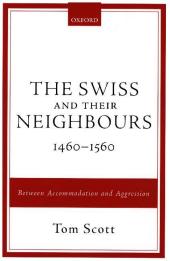 Neuerscheinungen 2017Stand: 2020-02-01 |
Schnellsuche
ISBN/Stichwort/Autor
|
Herderstraße 10
10625 Berlin
Tel.: 030 315 714 16
Fax 030 315 714 14
info@buchspektrum.de |

Tom Scott
The Swiss and their Neighbours, 1460-1560
Between Accommodation and Aggression
2017. 240 S. 5 black and white maps. 241 mm
Verlag/Jahr: OXFORD UNIVERSITY PRESS; OUP OXFORD 2017
ISBN: 0-19-872527-2 (0198725272)
Neue ISBN: 978-0-19-872527-5 (9780198725275)
Preis und Lieferzeit: Bitte klicken
Much of early-modern Europe was built up gradually by a series of leagues and alliances, and this volume seeks to demonstrate that the Swiss Confederation was one such composite polity, surviving until the end of the ancien regime by accommodating and absorbing internal conflicts through a sense of common identity and mutual obligation.
Renewed interest in Swiss history has sought to overcome the old stereotypes of peasant liberty and republican exceptionalism. The heroic age of the Confederation in the fifteenth century is now seen as a turning-point as the Swiss polity achieved a measure of institutional consolidation and stability, and began to mark out clear frontiers. The Swiss and their Neighbours, 1460-1560 questions both assumptions. It argues that the administration of the common
lordships by the cantons collectively gave rise to as much discord as co-operation, and remained a pragmatic device not a political principle. It argues that the Swiss War of 1499 was an avoidable catastrophe, from which developed a modus vivendi between the Swiss and the Empire as the Rhine became a
buffer-zone, not a boundary. It then investigates the background to Bernīs conquest of the Vaud in 1536, under the guise of relieving Geneva from beleaguerment, to suggest that Bernīs actions were driven not by predeterminate territorial expansion but by the need to halt French designs upon Geneva and Savoy.
The geopolitical balance of the Confederation was fundamentally altered by Bernīs acquisition of the Vaud and adjacent lands. Nevertheless, the political fabric of the Confederation, which had been tested to the brink during the Reformation, proved itself flexible enough to absorb such a major reorientation, not least because what held the Confederation together was not so much institutions as a sense of common identity and mutual obligation forged during the Burgundian Wars of the
1470s.
Before joining the Institute of Reformation Studies in St Andrews in 2004, Tom Scott was based in the School of History at the University of Liverpool. Before that he was a research fellow at Clare College, Cambridge. His main publications include: Regional Identity and Economic Change: The Upper Rhine, 1450-1600 (1997); Town, Country, and Regions in Reformation Germany (2005); The City-State in Europe, 1000-1600 (2012); and The Early
Reformation in Germany between Secular Impact and Radical Vision (2013)


